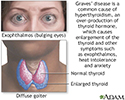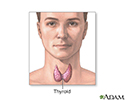Graves disease
Diffuse thyrotoxic goiter; Hyperthyroidism - Graves; Thyrotoxicosis - Graves; Exophthalmos - Graves; Ophthalmopathy - Graves; Exophthalmia - Graves; Exorbitism - Graves; Graves' diseaseGraves disease is an autoimmune disorder that leads to an overactive thyroid gland (hyperthyroidism). An autoimmune disorder is a condition that occurs when the immune system mistakenly attacks healthy tissue.
Autoimmune disorder
An autoimmune disorder occurs when the body's immune system attacks and destroys healthy body tissue by mistake. There are more than 80 autoimmune d...

Causes
The thyroid gland is an important organ of the endocrine system. The gland is located at the front of the neck above where the collarbones meet. This gland releases the hormones thyroxine (T4) and triiodothyronine (T3), which control body metabolism. Controlling metabolism is important for regulating mood, weight, and mental and physical energy levels.
Endocrine system
Endocrine glands release (secrete) hormones into the bloodstream. The endocrine glands include:AdrenalHypothalamusIslets of Langerhans in the pancrea...

Thyroxine
T4 (thyroxine) is the main hormone produced by the thyroid gland. A laboratory test can be done to measure the amount of free T4 in your blood. Fre...

Triiodothyronine
Triiodothyronine (T3) is a thyroid hormone. It plays an important role in the body's control of metabolism (the many processes that control the rate...

Metabolism
Metabolism refers to all the physical and chemical processes in the body that convert or use energy, such as:BreathingCirculating bloodControlling bo...

When the body makes too much thyroid hormone, the condition is called hyperthyroidism. (An underactive thyroid leads to hypothyroidism.)
Hyperthyroidism
Hyperthyroidism is a condition in which the thyroid gland makes too much thyroid hormone. The condition is often called overactive thyroid.

Hypothyroidism
Hypothyroidism is a condition in which the thyroid gland does not make enough thyroid hormone. This condition is often called underactive thyroid....

Graves disease is the most common cause of hyperthyroidism. It is due to an abnormal immune system response that causes the thyroid gland to produce too much thyroid hormone. Graves disease is most common in women over age 20. But the disorder can occur at any age and can affect men as well.
Symptoms
Younger people may have these symptoms:
- Anxiety or nervousness, as well as problems sleeping
- Breast enlargement in men (possible)
- Problems concentrating
- Fatigue
- Frequent bowel movements
- Hair loss
- Heat intolerance and increased sweating
Heat intolerance
Heat intolerance is a feeling of being overheated when the temperature around you rises. It can often cause heavy sweating. Heat intolerance usually...
 ImageRead Article Now Book Mark Article
ImageRead Article Now Book Mark Article - Increased appetite, despite having weight loss
Increased appetite
Increased appetite means you have an excess desire for food.
 ImageRead Article Now Book Mark Article
ImageRead Article Now Book Mark Article - Irregular menstrual periods in women
- Muscle weakness of the hips and shoulders
- Moodiness, including irritability and anger
- Palpitations (sensation of a strong or unusual heartbeat)
Palpitations
Palpation is a method of feeling with the fingers or hands during a physical examination. The health care provider touches and feels your body to ex...
 ImageRead Article Now Book Mark Article
ImageRead Article Now Book Mark Article - Rapid or irregular heartbeat
- Shortness of breath with activity
Shortness of breath
Breathing difficulty may involve:Difficult breathing Uncomfortable breathingFeeling like you are not getting enough air
 ImageRead Article Now Book Mark Article
ImageRead Article Now Book Mark Article - Shaking hands (tremors)
Tremors
A tremor is a type of shaking movement. A tremor is most often noticed in the hands and arms. It may affect any body part, including the head, tong...
 ImageRead Article Now Book Mark Article
ImageRead Article Now Book Mark Article - Weight loss
Many people with Graves disease have problems with their eyes:
- The eyeballs may seem to be bulging out and may be painful.
- Eyes can feel irritated, itchy, or tear more frequently.
- Double vision may be present.
- Decreased vision and damage to the cornea can also occur in severe cases.
Older people may have these symptoms:
- Rapid or irregular heartbeat
Irregular heartbeat
An arrhythmia is a disorder of the heart rate (pulse) or heart rhythm. The heart can beat too fast (tachycardia), too slow (bradycardia), or irregul...
 ImageRead Article Now Book Mark Article
ImageRead Article Now Book Mark Article - Chest pain
Chest pain
Angina is a type of chest discomfort or pain due to poor blood flow through the blood vessels (coronary arteries) of the heart muscle (myocardium). ...
 ImageRead Article Now Book Mark Article
ImageRead Article Now Book Mark Article - Memory loss or decreased concentration
- Weakness and fatigue
Exams and Tests
During the physical exam, your health care provider may find:
- You have an increased heart rate
- Your thyroid gland may be enlarged (goiter)
Other tests include:
- Blood tests to measure levels of thyroid stimulating hormone (TSH), T3, and free T4
- Radioactive iodine uptake and scan
Radioactive iodine uptake
Radioactive iodine uptake (RAIU) tests thyroid function. It measures how much radioactive iodine is taken up by your thyroid gland in a certain time...
 ImageRead Article Now Book Mark Article
ImageRead Article Now Book Mark ArticleScan
A thyroid scan uses a radioactive iodine tracer to examine the structure and function of the thyroid gland. This test is often done together with a ...
 ImageRead Article Now Book Mark Article
ImageRead Article Now Book Mark Article
This disease may also affect the following test results:
- Orbit CT scan or ultrasound
Orbit CT scan
A computed tomography (CT) scan of the orbit is an imaging method. It uses x-rays to create detailed pictures of the eye sockets (orbits), eyes and ...
 ImageRead Article Now Book Mark Article
ImageRead Article Now Book Mark Article - Thyroid stimulating immunoglobulin (TSI)
TSI
TSI stands for thyroid stimulating immunoglobulin. TSIs are antibodies that tell the thyroid gland to become more active and release excess amounts ...
 ImageRead Article Now Book Mark Article
ImageRead Article Now Book Mark Article - Thyroid peroxidase (TPO) antibody
- Anti-TSH receptor antibody (TRAb)
Treatment
Treatment is aimed at controlling your overactive thyroid. You may receive one or more types of treatment.
Beta-blocker medicines may help treat:
- Rapid heart rate
- Sweating
- Anxiety
They may be given until the hyperthyroidism is controlled.
Antithyroid medicines:
- Block or change how the thyroid gland uses iodine
- May be used to control the overactive thyroid gland before surgery or radioiodine therapy
- May be used as a long-term treatment
Radioactive iodine is given by mouth. It then concentrates in the overactive thyroid tissue and causes damage.
Surgery may be done to remove the thyroid.
If you have had radioactive iodine treatment or surgery, you will need to take replacement thyroid hormones for the rest of your life. This is because these treatments destroy or remove the gland.
TREATMENT OF THE EYES
Some of the eye problems related to Graves disease often improve after treatment with medicines (including selenium), radiation, or surgery. Radioiodine therapy can sometimes make eye problems worse. Eye problems are worse in people who smoke, even after the hyperthyroidism is treated.
Sometimes, prednisone is needed to reduce eye irritation and swelling. Prednisone is a steroid medicine that suppresses the immune system. Other treatments to suppress the immune system may be needed. Ask your provider if these would help you.
Sunglasses, cool compresses, and eye drops may reduce eye irritation. In rare cases, surgery or radiation therapy (different from radioactive iodine) may be needed to prevent further damage to the eye and loss of vision.
Outlook (Prognosis)
Graves disease often responds well to treatment. Thyroid surgery or radioactive iodine often will cause an underactive thyroid (hypothyroidism). Without getting the correct dosage of thyroid hormone replacement, hypothyroidism can lead to:
- Depression
Depression
Depression may be described as feeling sad, blue, unhappy, miserable, or down in the dumps. Most of us feel this way at one time or another for shor...
 ImageRead Article Now Book Mark Article
ImageRead Article Now Book Mark Article - Mental and physical sluggishness
- Weight gain
- Dry skin
- Constipation
- Cold intolerance
Cold intolerance
Cold intolerance is an abnormal sensitivity to a cold environment or cold temperatures.
 ImageRead Article Now Book Mark Article
ImageRead Article Now Book Mark Article - Abnormal menstrual periods in women
When to Contact a Medical Professional
Contact your provider if you have symptoms of Graves disease or your eye problems or other symptoms get worse or do not improve with treatment.
Go to the emergency room or call 911 or the local emergency number if you have symptoms of hyperthyroidism with:
- Decrease in consciousness
- Fever
- Rapid, irregular heartbeat
- Sudden shortness of breath
References
Hollenberg A, Wiersinga WM. Hyperthyroid disorders. In: Melmed S, Auchus RJ, Golfine AB, Koenig RJ, Rosen CJ, eds. Williams Textbook of Endocrinology. 14th ed. Philadelphia, PA: Elsevier; 2020:chap 12.
Pearce EN, Hollenberg AN. Thyroid. In: Goldman L, Cooney KA, eds. Goldman-Cecil Medicine. 27th ed. Philadelphia, PA: Elsevier; 2024:chap 207.
Smith JR, Wassner AJ. Thyrotoxicosis. In: Kliegman RM, St. Geme JW, Blum NJ, Shah SS, Tasker RC, Wilson KM, eds. Nelson Textbook of Pediatrics. 21st ed. Philadelphia, PA: Elsevier; 2020:chap 584.
Weetman AP, Kahaly GJ. Graves disease. In: Robertson RP, ed. DeGroot's Endocrinology. 8th ed. Philadelphia, PA: Elsevier; 2023:chap 71.
Endocrine glands - illustration
Endocrine glands release hormones (chemical messengers) into the bloodstream to be transported to various organs and tissues throughout the body. For instance, the pancreas secretes insulin, which allows the body to regulate levels of sugar in the blood. The thyroid gets instructions from the pituitary to secrete hormones which determine the rate of metabolism in the body (the more hormone in the bloodstream, the faster the chemical activity; the less hormone, the slower the activity).
Endocrine glands
illustration
Thyroid enlargement - scintiscan - illustration
This image shows the enlargement of the thyroid gland and extension down behind the breastbone (retrosternal space). The image, called a scintiscan, was generated using a radioactive isotope.
Thyroid enlargement - scintiscan
illustration
Graves disease - illustration
Graves disease is an autoimmune disorder that involves overactivity of the thyroid (hyperthyroidism). Hallmarks of the condition are bulging eyes (exophthalmos), heat intolerance, increased energy, difficulty sleeping, diarrhea and anxiety.
Graves disease
illustration
Thyroid gland - illustration
The thyroid gland, a part of the endocrine (hormone) system, plays a major role in regulating the body's metabolism.
Thyroid gland
illustration
Endocrine glands - illustration
Endocrine glands release hormones (chemical messengers) into the bloodstream to be transported to various organs and tissues throughout the body. For instance, the pancreas secretes insulin, which allows the body to regulate levels of sugar in the blood. The thyroid gets instructions from the pituitary to secrete hormones which determine the rate of metabolism in the body (the more hormone in the bloodstream, the faster the chemical activity; the less hormone, the slower the activity).
Endocrine glands
illustration
Thyroid enlargement - scintiscan - illustration
This image shows the enlargement of the thyroid gland and extension down behind the breastbone (retrosternal space). The image, called a scintiscan, was generated using a radioactive isotope.
Thyroid enlargement - scintiscan
illustration
Graves disease - illustration
Graves disease is an autoimmune disorder that involves overactivity of the thyroid (hyperthyroidism). Hallmarks of the condition are bulging eyes (exophthalmos), heat intolerance, increased energy, difficulty sleeping, diarrhea and anxiety.
Graves disease
illustration
Thyroid gland - illustration
The thyroid gland, a part of the endocrine (hormone) system, plays a major role in regulating the body's metabolism.
Thyroid gland
illustration
Review Date: 2/28/2024
Reviewed By: Sandeep K. Dhaliwal, MD, board-certified in Diabetes, Endocrinology, and Metabolism, Springfield, VA. Also reviewed by David C. Dugdale, MD, Medical Director, Brenda Conaway, Editorial Director, and the A.D.A.M. Editorial team.





